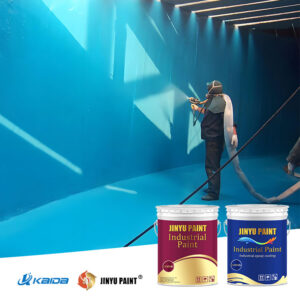Description
Product Description:
This product is a low-VOC, high-solids, two-component micaceous iron oxide epoxy intermediate paint designed for heavy-duty corrosion protection. Formulated with micaceous iron oxide pigments (MIO), it provides enhanced durability and long-term anti-corrosion performance. As a high-build epoxy coating, it ensures superior film thickness and resistance to harsh environmental conditions.
Product Usage:
This micaceous iron oxide paint is widely used in industrial and marine environments as part of a multi-layer protective coating system. It is ideal for both maintenance and new construction projects, offering excellent barrier protection for steel structures such as offshore platforms, oil and gas facilities, chemical plants, power stations, bridges, and marine infrastructure. Its flake-reinforced composition (compliant with ASTM D7091 standards) improves moisture resistance and UV stability when top-coated, making it a critical component in corrosion protection systems for long-term asset preservation.
Physical Parameters:
Color: Gray, Iron Red
Volume Solids: 80±2%
Recommended Dry Film Thickness (DFT): 100 μm
Recommended Wet Film Thickness (WFT): 125 μm
Theoretical Coverage:4.6 m²/kg; 8 m²/L (at 100 μm DFT)
Practical Coverage: Allow for appropriate application losses
Flash Point (mixed): 27±2°C
Application Instructions:
Surface Preparation:
Prior to application of this high-performance micaceous iron oxide epoxy coating, all surfaces must undergo thorough preparation to ensure optimal adhesion and long-term corrosion protection. The substrate must be completely clean, dry, and free from contaminants including oil, grease, dust, and oxidation products. Surface assessment and preparation shall comply with ISO 8504:2000 standards. Any oil or grease contamination must be removed through solvent cleaning in accordance with SSPC-SP1 specifications.
For steel substrates, abrasive blast cleaning to Sa 2.5 (ISO 8501-1:2007) or SSPC-SP6 commercial blast standards is mandatory. Should oxidation occur after blasting but before coating application, the surface must be re-blasted to meet the required visual standards. Any surface defects exposed during blasting operations, including sharp edges or weld spatter, must be properly addressed through grinding, filling, or other appropriate treatments.
This micaceous iron oxide paint should be applied over properly prepared anti-corrosion primer systems, ensuring the primer surface is completely clean and contamination-free. Special attention must be given to welds and damaged areas, which require blast cleaning to Sa 2.5 (ISO 8501-1:2007) or SSPC-SP6 standards. When applying over zinc-rich primers, verify the surface is free from zinc salts, thoroughly cured, and meets all cleanliness requirements. The substrate temperature must remain above 10°C and maintain a minimum 3°C margin above the dew point temperature throughout application to prevent moisture condensation.
Mixing:
This product is supplied in two containers and should be combined to form a single unit. Each time, it must be mixed in the specified ratio and used within the recommended pot life. (1) Stir the base material (A) with a power mixer. (2) Combine all of the curing agent (B) with the base material (A) and thoroughly mix with a power mixer.
Mixing service life:
| 15℃ | 25℃ | 35℃ |
| 4H | 2H | 1H |
Pot Life: 15°C 25°C 40°C 5 hours 3 hours 2 hours
Thinner: JINYU No. 1 Thinner
Application Methods: Airless Spray Air Spray Brush/Roller
Thinning Ratio: 0-5% 5-15% 0-10%
Airless Spray: Nozzle Size: 0.46-0.69mm Spray Pressure: 15 MPa
Drying Times:
| (Wet film thickness 156μm, relative humidity 50%) | 15℃ | 25℃ | 35℃ |
| Fingers dry to touch | 6H | 2H | 1H |
| Transportable | 18H | 8H | 4H |
| fully cured | 14 days | 7 days | 3 days |
Recoat interval:
| (Wet film thickness 156μm, relative humidity 50%) | 15℃ | 25℃ | 35℃ |
| shortest | 18H | 10H | 4H |
Packaging Specifications:
25kg per set
Storage Period:
In a cool, dry, and shaded area, unopened storage life is one year (at 25°C).

The Difference Between Micaceous Iron Oxide Intermediate Paint and Ordinary Anticorrosive Paint
1. What is epoxy micaceous iron oxide intermediate paint?
Think of epoxy micaceous iron oxide intermediate paint as the “core layer” in a corrosion protection system – much like the filling in a sandwich. While the primer acts as the base and the topcoat serves as the outer layer, this grayish coating, formulated with epoxy resin and micaceous iron oxide (MIO), functions as the critical middle layer that significantly enhances durability.
2. Advantages of micaceous iron oxide paint
- Unlike standard rust-proof paints, micaceous iron oxide paint offers superior protection through its unique flake-reinforced structure. The overlapping MIO platelets create a “fish-scale armor” effect, blocking over 90% of moisture penetration. Accelerated tests show that while conventional coatings develop rust within 3 years, systems incorporating this intermediate layer remain intact for 5+ years.
- This specialized coating also acts as a “sunscreen” for steel structures, absorbing UV radiation to prevent primer degradation – particularly vital for bridges and construction machinery, where it doubles the service life compared to topcoat-only systems.
- With exceptional self-leveling properties, micaceous iron oxide paint can fill weld seams and surface irregularities at applied thicknesses up to 150μm (three times thicker than standard primers), serving as an ideal “leveling agent” for imperfect substrates.
- Laboratory results demonstrate a 40% improvement in adhesion strength when using this intermediate coat, making it indispensable for marine applications like port machinery and offshore structures exposed to constant humidity.
3. Critical Application Scenarios of micaceous iron oxide paint
Per GB/T 30790 standards, five high-risk environments mandate this protection: the interior steel boxes of sea-crossing bridges, pipe racks in chemical plants, coastal wind turbine towers, exterior walls of oil storage tanks, and heavy port equipment like cranes. These applications benefit from the extended 20+ year lifecycle provided by proper MIO coating systems.











